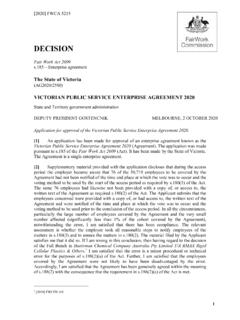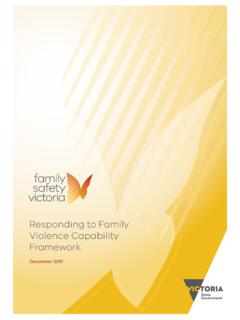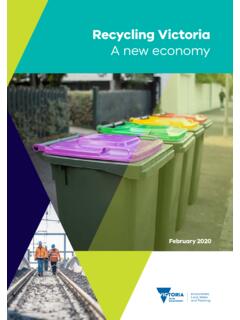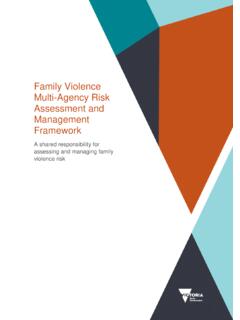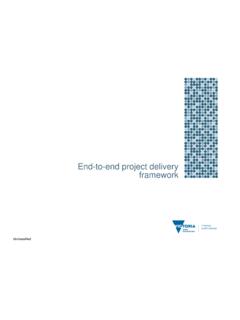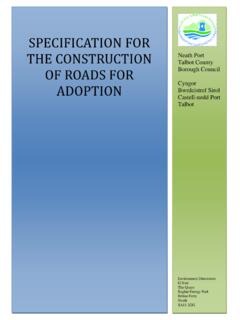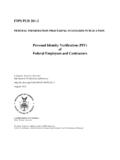Transcription of PUBLIC SECTOR INDUSTRIAL RELATIONS POLICIES 2015
1 PUBLIC SECTOR . INDUSTRIAL . RELATIONS . POLICIES . 2015 . 1. Department of Economic Development, Jobs, Transport and Resources INDUSTRIAL RELATIONS Victoria June 2016. 2. CONTENTS. 1 INDUSTRIAL RELATIONS LANDSCAPE 3. Key principles 3. Application of the POLICIES 3. 2 GOVERNANCE ROLE OF DEPARTMENTS, AGENCIES. AND CENTRAL AGENCIES 4. Role of departments and agencies 4. 3 GOVERNMENT'S INDUSTRIAL . RELATIONS PRINCIPLES 5. Union participation in the workplace 5. Secure employment 5. Maintenance of PUBLIC SECTOR employment 5. Family violence 5. Bargaining principles 6. Consultation & dispute resolution 6. Work and family 7. Paid parental leave 7. Enterprise agreement leave entitlements and the National Employment Standards 7.
2 Right of entry 8. Individual flexibility term 8. 4 CONSTITUTIONAL LIMITATIONS 9. 5 agreement MAKING AND WAGES POLICY 10. agreement making major and non-major agreements 10. Wages policy 10. The enterprise bargaining framework 10. Types of enterprise agreements 11. 6 REDUNDANCY AND OTHER MATTERS 12. Redundancy, redeployment and retrenchment 12. Termination of employment 15. Employee entitlements on transfer 16. 1. 7 FAIR WORK ACT REQUIREMENTS: CONTENT OF AGREEMENTS 18. Consultation 18. Flexible working arrangements 18. Individual flexibility term 18. PUBLIC holidays 19. Dispute resolution 19. 8 STEPS FOR MAKING ENTERPRISE AGREEMENTS 20. Notice of employee representational rights 20. Good faith bargaining 20.
3 Voting process 21. Approval of enterprise agreement by the FWC 21. 9 INDUSTRIAL ACTION 22. 10 RIGHT OF ENTRY 24. 11 ATTACHMENTS 25. Attachment 1: Consultation model clause 25. Attachment 2: Dispute resolution model clause 27. Attachment 3: Work and family model clauses 29. Attachment 4: Victorian PUBLIC Service redeployment policy 38. Attachment 5: Example Notice of employee representational rights 40. Attachment 6: Guide to wages policy and service delivery partnership plans 2015 41. Glossary 45. 2. 1 INDUSTRIAL RELATIONS LANDSCAPE. Victoria's PUBLIC SECTOR provides services that are honouring all terms collectively bargained essential to the community. As the State's largest for within formal agreements and not using employer, the Government will set the example for technical constitutional arguments to avoid all Victorians by recognising, valuing and regarding these agreed obligations.
4 The work of the Victorian PUBLIC SECTOR agencies. providing fair and comprehensive employment The Government is committed to PUBLIC SECTOR INDUSTRIAL conditions in awards and agreements;. RELATIONS based on consultation, cooperation and good supporting POLICIES and working conditions faith bargaining, underpinned by a safety net of fair which enable employees to balance work employment conditions. The Government, as model and life;. employer, is committed to ensuring that enterprise agreements are negotiated respectfully, in good protecting employees from all forms of faith, and conducted in a timely manner. workplace bullying;. The Government also considers it important that supporting POLICIES that promote gender an equitable and consistent approach to PUBLIC equity in the workplace and employment SECTOR INDUSTRIAL RELATIONS is adopted by departments opportunities for women; and and agencies.
5 Supporting employment opportunities for This document outlines the Government's policy on underrepresented groups across the PUBLIC a number of important PUBLIC SECTOR INDUSTRIAL RELATIONS SECTOR and in particular Aboriginal and matters. This includes various standards, requirements Torres Strait Islander people. and guidelines to foster a productive INDUSTRIAL RELATIONS culture and achieve high performance with effective While individual departments and agencies and constructive workplace partnerships. have flexibility in deciding the specific content of enterprise agreements, it is their responsibility to ensure these key principles underpin their KEY PRINCIPLES INDUSTRIAL RELATIONS strategies and actions.
6 The key principles underpinning the Government's approach to INDUSTRIAL RELATIONS are as follows: APPLICATION OF. promoting INDUSTRIAL RELATIONS based on THE POLICIES . consultation and cooperation between employers, employees and their unions; These POLICIES apply to all departments and PUBLIC SECTOR bodies of the State of Victoria and their non- promoting the PUBLIC service and PUBLIC executive level employees, as defined under the SECTOR agencies as model employers; PUBLIC Administration Act 2004 (Vic) (PA Act) and respecting employee's choice to join a union other Victorian legislation. For the avoidance of doubt, and be properly represented in the workplace; the POLICIES apply to all PUBLIC health services, schools and standalone TAFE institutes.
7 For the purposes of supporting the provisions of modern awards the POLICIES , the term agency is used to refer to all as the effective safety net for all PUBLIC those PUBLIC SECTOR bodies of the State of Victoria SECTOR employees; other than a department. promoting collective bargaining with employees The POLICIES do not apply to: and their bargaining representatives rather than individual bargaining; the employment of executive employees employed under contracts administered by the Government setting of wages and conditions through SECTOR Executive Remuneration Panel or under the comprehensive agreements that are fiscally Victorian PUBLIC Service executive contracts; and sustainable and promote the highest quality services to Victorians and deliver improvements universities, including the four dual SECTOR that are measurable; universities (RMIT, Swinburne University, Victoria University and Federation University Australia).
8 Promoting secure employment especially by limiting casual and labour hire employment;. supporting fair, cooperative and safe workplaces throughout the PUBLIC SECTOR that are free from discrimination;. 3. 2 GOVERNANCE ROLE OF DEPARTMENTS, AGENCIES AND CENTRAL AGENCIES. ROLE OF DEPARTMENTS Central agencies AND AGENCIES. Central Bargaining Unit The roles and responsibilities of departments and agencies in the negotiation of enterprise The Central Bargaining Unit (CBU) is responsible agreements and other INDUSTRIAL RELATIONS matters for assisting departments and agencies with INDUSTRIAL are summarised as follows: RELATIONS matters and enterprise bargaining and to ensure the consistency of advice to employers and stakeholders and compliance with the POLICIES .
9 Departments and agencies Although the CBU will not be directly involved in Departmental Secretaries are responsible for the all PUBLIC SECTOR negotiations, it will be a resource overall management of INDUSTRIAL RELATIONS issues that departments, agencies and unions can draw within their department and portfolio agencies upon to assist in the bargaining process. In particular, (and associated projects), including application of the role of the CBU is to: the INDUSTRIAL RELATIONS POLICIES . While Ministers will (a) implement the Government's INDUSTRIAL maintain constructive relationships with unions and RELATIONS POLICIES and provide advice employees to facilitate successful INDUSTRIAL RELATIONS to agencies and unions in relation outcomes, they remain outside formal negotiations.
10 To those policy parameters;. Departments are responsible for ensuring (b) oversee bargaining across the PUBLIC SECTOR ;. consistent application of POLICIES and practices across agencies in their portfolio. (c) become involved in bargaining negotiations to assist the parties to find workable solutions Departments are the first point of contact for before they turn into intractable disputes;. portfolio agencies seeking information and advice specific to their portfolio. (d) assist in the resolution of disputes in accordance with the Government's Portfolio agencies are responsible for policy parameters between departments operational matters. and agencies and unions; and Departments and agencies are responsible (e) provide high level and strategic advice to for the timely development of management government on INDUSTRIAL RELATIONS matters.

